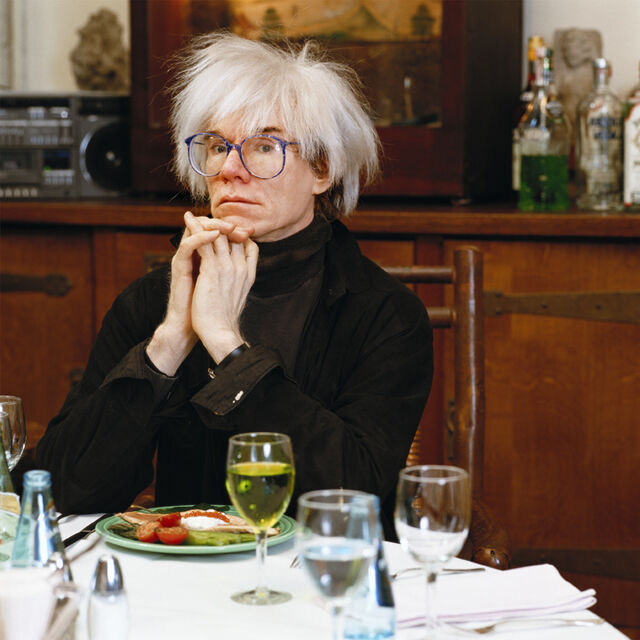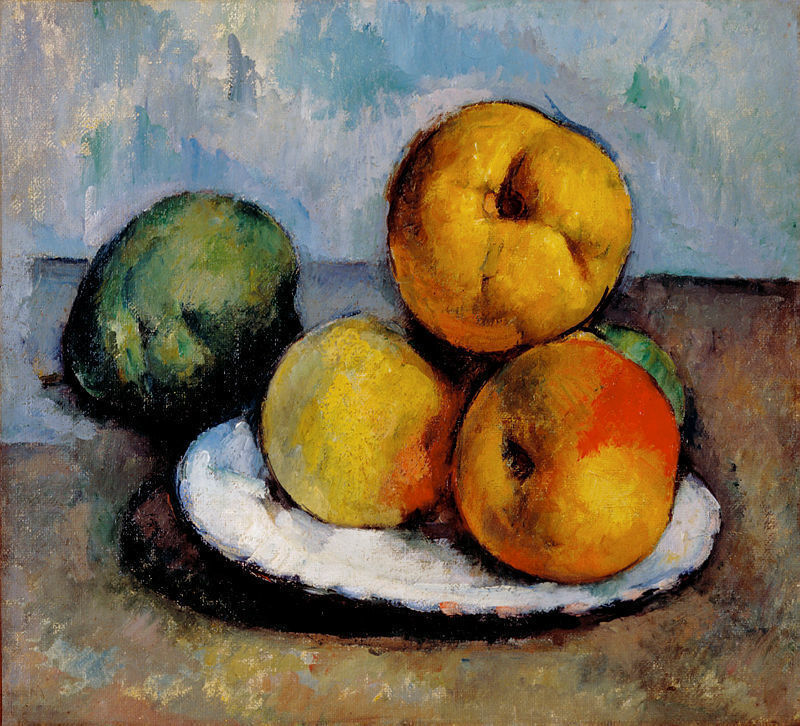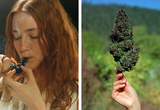I’m in the back room of Meredith Rosen Gallery in New York, talking food with Jennifer Rubell moments before she begins a daily performance (part of her current exhibition there), in which she is the recipient of numerous pies to the face. For the artist, food serves as a medium and a source of inspiration.
“I eat in a very particular way,” Rubell says. “If I wrote down everything I consumed in a day and you looked at my work, you’d understand that it’s exactly the same thing. I would call it minimalist, in the sense that every detail matters, the vegetable, meat, fish, whatever. It’s great food all the time, I never waste a meal—except for the fucking Chipotle I just had.”
Rubell assures me she’s not alone: virtually all the artists she can think of are exacting about the way they eat, though few follow diets. Rosen, her dealer, adds that most artists are also good cooks. And why not? Artists, almost by definition, are sensualists who like making things, and food certainly engages several senses. But if artists are paying so much attention to food, I wonder if they might be using it, even inadvertently, to boost creativity, or if one might even consciously try to optimize one’s output with nutrition.

Jennifer Rubell, Consent, 2018, daily interactive performance. Photo by Jason Schmidt. Courtesy of Meredith Rosen Gallery.

Jennifer Rubell, Consent, 2018, daily interactive performance. Photo by Jason Schmidt. Courtesy of Meredith Rosen Gallery.
Dr. Fernando Gómez-Pinilla, a professor in the Departments of Neurosurgery and Integrative Biology and Physiology at UCLA, thinks we can. Ten years ago, he undertook a study, for the journal Nature Reviews Neuroscience, of the effects of nutrients on cognitive function. “Food is like a pharmaceutical compound that affects the brain,” he said in an interviewafter the study was published. “This raises the exciting possibility that changes in diet are a viable strategy for enhancing cognitive abilities.” Since then, he tells me, “there have been many studies that establish the fact that different food components have very powerful roles in cognitive function.”
Taken together these investigations suggest some avenues toward enhancing creativity, from the broadest strategy to minute, tactical interventions. One study, for instance, found that young adults who simply ate more fruits and vegetables “reported higher average eudaemonic well-being, more intense feelings of curiosity, and greater creativity compared with young adults who ate less.” This finding ought to tickle your own curiosity, since there is a long-assumed link between creativity and melancholia, or depression. It turns out that in aggregate these studies tell us a lot about what science has determined (or assumes) to be the ideal physical and emotional conditions for creativity, such as overall happiness or being chilled out.
As to why eating more fruits and vegetables might increase our sense of well-being and make us more creative, Dr. Gómez-Pinilla argues for a two-fold answer. He points first to the role of flavonoids, which are compounds found most commonly in fruit and many vegetables. Although the science underlying the exact actions of these compounds remains fuzzy, it seems that they both increase blood flow within the brain and promote synaptic plasticity (the ability to make stronger connections between synapses, increasing memory and sharpening thinking). The second reason is that consuming more fruits and vegetables often means eating less sugar, and excess sugar has been shown to contribute to cognitive decline and depression. So, Rubell would do well to avoid eating pies in her performance.
Diet, however, is never simple. It’s always a matter of trade-offs, as is demonstrated through the pros and cons of sugar. Glucose (one type of sugar) is the primary fuel source for all cells, especially those in the brain, because the brain uses most of our energy. Not eating enough can leave you feeling sluggish and mentally slow. However, eating too much sugar—which, I think we all recognize, is woefully easy to do—is thought to accelerate the aging of cells and, according to a review by the Harvard Department of Neurobiology is linked “to memory and cognitive deficiencies,” neither of which is a plus for creative thinking.
Consider the problem of chocolate. It contains cocoa polyphenols that can elevate mood and alleviate anxiety—which can hinder the decision-making that is central to creative endeavors. These traits have led to articles extolling the treat as a productivity enhancer. Yet, chocolate is almost always mixed with high amounts of sugar, which in the short term may well help you ramp-up output and be more creative, but over time can impair brain function and lead to all sorts of health problems.
Perhaps we’d do better to stick with omega-3 fatty acids, which Dr. Gómez-Pinilla puts “at the top of the list.” He pointed specifically to DHA and EPA, which are found in fish, fish oil, and, to a smaller extent, in pastured eggs and beef. People with various cognitive disorders as well as attention problems often have low levels of these fatty acids, and some studies have concluded that consuming fish or fish oil can have a protective effect on the brain. There is also some evidence that supplementing with DHA and EPA can help brain efficiency and heighten cognitive performance. Walnuts are rich in another omega-3 fatty acid, ALA, but also in antioxidants, vitamin E, and folate. What this combination of compounds does to the brain remains unclear, but one study out of UCLA found that munching on a handful of walnuts a day, over a period of years, resulted in improved cognition in a wide swathe of the population.
Still, a handful of fish-oil pills or walnuts will not transform you into a Leonardo. I would add that anything other than high-quality fish oil will be destructive rather than helpful, and sources of the good stuff are both difficult to find and expensive. Then again, a steady diet of fish might allow you to remain highly inventive as you age.
But long-term, incremental changes are not what most of us are looking for. What we want is a hack, the magic pill that will blast your mind into the creative stratosphere.
Well, aside from re-engineering your DNA, there aren’t a lot of options. There are those who whisper about tyrosine, one of the few substances shown to have a direct effect on creativity. A dopamine precursor abundant in seaweed, bananas, and almonds, tyrosine has been shown to “promote convergent (‘deep’) thinking,” as the authors of a study in the journal Psychological Research put it, and “facilitate control-hungry creative operations.”
Others, like the painter Caio Fonseca, who in his spare time is also a pianist and classical composer, swear off food altogether—or at least some of the time. Not long ago, Fonseca experimented with a seven-day fast that left him feeling calm and remarkably clear-headed. The experience led him to begin intermittent fasting, eating all his food within an eight-hour window each day. The practice has resulted in improved brain function—in studies on mice—and claims numerous adherents among humans. “It’s not that I notice feeling sharper when I’m fasting,” says Fonseca. “But when I slip up and break the habit, I notice feeling foggier and less energetic.”
The irony of all this searching for the perfect brain-kibble is that many of us already indulge in the most tried and true creativity hack known to history: alcohol. As generations of boozing artists and writers can attest, alcohol, at least in the right amount, works. But how it works has only recently been demonstrated. And, oddly enough, it’s by impairing brain function (which means, of course, it’s not healthy to consume anything more than small amounts). Alcohol hampers concentration, allowing the mind to wander, and, several studies have found, a straying mind is actually better at creative problem solving than a focused mind.
I would add that alcohol is also disinhibiting, so it may make you less likely to edit out seemingly “incorrect” notions—such as the creeping thought that diet is too complex a subject to keep reading about, so better just have another whiskey.
Daniel Kunitz








No comments:
Post a Comment